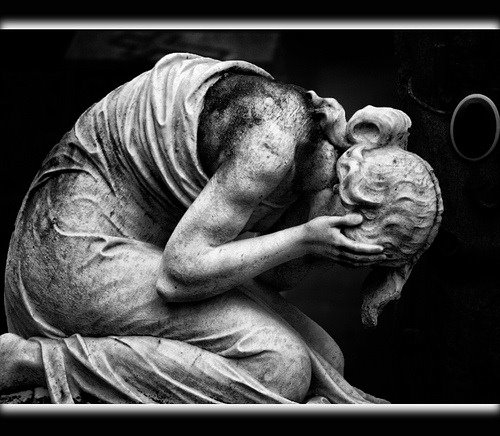At first I felt as though my heart had been ripped open.
Then my mind went into a state of disbelief and confusion. I felt a sort of numbness and despair. Finally, my heart and mind came to rest in a state of meditation and compassion… and I didn’t even know her.
I just learned of the suicide of a brilliant young woman, Sharoni Stern Siegel, a local artist who was beloved by those who knew her and had shared in her art and her passion for life. Her Facebook page has been swamped with posts of deep grief, disbelief, “If onlys,” “Whys?,” and all of the aftershocks felt within the community of those left behind after a suicide.
The lingering question in most peoples’ minds, “Why?” seems a fitting introduction to this post, the fourth in this series on Meditation and Compassion.
Why someone resorts to taking his or her life is the lingering question left behind for the living. It’s the haunting echo that wakes the survivors in the middle of the night. It’s the nagging itch in the center of one’s heart that clings and clutches and won’t let go. I hope that this post will help you to understand why someone would even consider suicide and why we all suffer to varying degrees due to our mind.
When you enter into the heart of meditation and compassion you’ll find the wellspring of compassion. This compassion can be sparked by realizing how much we all suffer due to the chaos of our non-meditative mind and the constant turmoil that we find in its grips. The realization of how much you suffer can be applied to others, realizing that everyone else, even the rich and famous, also feels the same angst that you feel! No one is free from the wacked-out monkey-mind unless they come to know their mind…and learn how to tame it.
Meditation and compassion are ways to free ourselves from the endless cycle of suffering of the mind and to bring us out of the dark cave of despair and into the clear-light of day. It’s a way of connecting to an inherent nature of our mind that is free from the drama, unstained by the emotions, and that is – simply – a pure awareness.
To meditate is to:
Just let go and relax and remain in the pure awareness of the present moment. When we allow our mind to settle in its own natural peace, we discover a deep stillness that’s always with us. We begin to discover the true purpose of meditation, which is to introduce us to the unchanging pure awareness that underlies the whole of our experience. The practice of meditation is to become more and more familiar with this awareness in every aspect of our life. This is what meditation really is. [from the site, What Meditation Really Is]
This quote reminds us that within each of us there resides an “unchanging pure awareness.” When we connect with that awareness through meditation, we can recognize in others the suffering that they endure when they fail to know the deep stillness present within. Your recognition of their suffering is compassion and is strengthened through your practice of meditation. This compassion can also bring you to the recognition of why someone, under extreme mental duress, who has not experienced the peace of their meditative mind, may take their own lives or even the life of another. Suicide is the epitome of the suffering of the mind without the recognition of its own natural peace.
Meditation and compassion isn’t an escape though; it’s not a quick fix for suffering or a bandage for the scars that we suffer. Meditation isn’t an “out” from the chaos that we can experience within the untamed mind. Meditation is a connection to what is at its heart an inherent quality of mind that is always present, regardless of what else is going on in our mind. The meditative mind is even hidden beneath the clouded thoughts of one who takes his or her life. It’s hidden beneath our mind, even when we’re in the midst of chaos that feels overwhelming and hopeless. It’s even present within your mind, right here, right now.
The meditative mind, the natural peace and deep stillness, is like an inner wealth that until it’s recognized, goes unnoticed and unutilized. Suicide is like a person living in a house whose basement is full of wealth, full of priceless jewels and, who not realizing what is in the basement, dies of poverty.
Not knowing about the “pure awareness” is what we all experience before we begin a contemplative path. Some may argue that a contemplative life isn’t necessary to tap this deep wellspring of inner strength. After all, artists, musicians and poets experience similar states and even recognition of something deeper within the mind. Yet artists, musicians and poets also take their own lives when confronted with intolerable mental anguish.
I imagine that there is not one among us who has not experienced mental suffering to the point where we had to wonder whether there was some easier way out of our chaotic mind; maybe even contemplating death or at least running far, far away as a last alternative. You may have found yourself on a precipice of emotions, perhaps due to illness, loss of income, or loss of a loved one, when it would have felt easier to jump than to carry on. So, what made you cling to that narrow ledge? What made you turn from the free-fall into the unknown and to resume the journey, despite bleak or challenging circumstances?
If only we could speak to those who end their lives by their own hand and say, “Look more deeply within my dear friend. Look past the clouds of your mind and into the vast expanse of the sky-like nature of your mind. Connect with the natural peace and deep stillness within your mind.”
If I’m speaking as if getting to a state of natural peace is easy, that’s my shortcoming. Nothing could be further from the truth. Meditation isn’t about blissing out, floating in space, above it all. It’s about being in the thick of the crap, being tossed by the waves of suffering, and still having as one’s anchor the meditative mind. In a recent post, “Too Much Chaos in Your Life? Shut Up and Meditate,” I shared the particularly difficult times that I’ve had recently. And you, the readers of this blog, wrote to me directly and shared that you’ve felt this way before. Some of you wrote that you’ve been at your “edge” and this it’s only been because of a meditation or spiritual practice that you’ve been able to make it through the day.
What is the difference between those of us who choose to turn from the cliff and those who leap? I’m not sure, what do you think? Since we can never ask them what it was within their mind that caused them to make their final decision, we’ll never know what kind of pain was too much to endure. And even in those who have left us some kind of hint, we can never know their mind. But we can reflect on our own minds and on the chaos that we encounter even (or especially?) when we begin to meditate. By practicing and becoming skillful in our meditation, we can know how to turn our mind towards peace in the midst of turmoil. And in this knowing, we can share with others our experience and possibly, just maybe, help to turn them from the jump…or to at least give them the wings to soar rather than fall.
I’m not certain that I’ve been able to articulate what I truly feel needs to be said, and yet I had to say something. It would be even more of a loss if I were unable, in some small way, to inspire you to practice your meditation with diligence and to share your learned wisdom with others. Who knows, through your meditation, you may share some of your wisdom that when spoken to another at just the right time, may prevent them from taking a drastic step off the cliff…
Sadly, Sharoni wasn’t able to turn from the precipice and so, leaped to her freedom from this life’s mental anguish. That is why this post is dedicated to Sharoni Stern Siegel. May her mind be free from all suffering and may those who knew her well rejoice in having met such an amazing spirit.
———————————————————————————————————————————————-
Please feel free to share your comments. Is this post helpful? Does it work? Doesn’t it work? Let me and others know whether you find this post helpful. And, as always, please feel free to contact me if you’d like to see additional content or other discussions on this site. For more information on how to meditate, exercises in working with the breath, and other nifty stuff, please see the Related Posts below.
Also, don’t forget to download the free ebook, Can Meditation Change the Way that You View Your World?, for help with getting started in you meditation practice. Also, you can download the ebook, How to Work with the Four Distractions to Meditation.
Also, please check out the blog drop-down menu for compassion in the navigation bar at the top of this page.




[…] posts ago I wrote about the suicide of Sharoni Stern Siegel and we discussed how you can use an event like Sharoni’s death as a means to appreciate your […]
Hi Jerome,
Another brilliant newsletter.
But more questions than answers.
Paraphrasing:
“Just let go and relax and remain in the pure awareness of the present moment. When we allow our mind to settle in its own natural peace, we discover a deep stillness that’s always with us. We begin to discover the true purpose of meditation, which is to introduce us to the unchanging pure awareness that underlies the whole of our experience. The practice of meditation is to become more and more familiar with this awareness in every aspect of our life. This is what meditation really is.”
Really? The Buddha said not to believe anything and to investigate even what he said. And this is the journey to enlightenment. And we can only investigate that “which is” presently an experience.
This statement needs to be unpacked because what is dangerous is not unpacking the statement and swallowing it as a whole. Self deception is at the root of ignorance. Repetition creates sameness which is resistant to change.
The mind likes certainty, the known, because it can create a sense of security and certainty through expectation. In doing so, it focuses to the imagined future and ignores the present experience.
Open mindedness and fluidity of the mind allows the mind to entertain all possibilities until a certainty is born (see Gestalt Ground/figure model). The certainty is mostly conditioned as a re-cognition of an experience (where memory is involved) and gives us a feeling of stability. But that limits possibilities and creativity.
The mind is already and always in the present moment. As awareness. What appears not to be in the present moment is the content of awareness. That is the deception.
We don’t need to let go of anything. Here is why:
Do you remember a Zen story about a guy who went to a monastery in search of enlightenment, cleaning and cooking for 20 years. Meanwhile, other students came, got enlightened and left.
One day, the guy got the proverbial “shits”, went to the Abbot and said that he was fed up doing his job whilst others got enlightened.
The Abbot, seeing that he was ripe for enlightenment, held a finger in the air, and asked:
What is missing here?”
The student, understood, his face lit up, got enlightened and left.
You don’t need to relax. Just bring awareness into the not-relaxed state and relaxation happens. Any form of trying, looking at what is missing takes awareness away from “what is” into “what should be”.
That creates discontentment and conflict. So when the running away from “what is” into “what should be” ceases, enlightenment occurs.
Everything there is, is here right now, and become aware of it.
I have coined an expression sometime ago:
“To expect is to anticipate therefore to miss the obvious.”
What “should be” creates desire which is a movement away from” what is”. And that is the deception, that something is missing.
Yours as always
Hi Johnny. As always, I appreciate your kind insights and comments relating to my posts. To clarify, I claim neither realization nor enlightenment. I am neither a scholar nor a pundit. I do not claim to be able to introduce the readers of this blog to the nature of their minds. My audience is, in general, those who are new to meditation and/or who come to the site to reinforce what they already know. And, they are not – for the most part – “Buddhists.” So, while I understand what you are saying, on the relative level, for what it points towards, the absolute, I’m attempting to work with what my readers can understand. I get what you’re saying, but the readers of this blog need the means to begin the journey after which time, at some point – maybe – when they find their teacher, they’ll be able to drop the method and simply be. Meditation is not, getting used to is. It’s the getting used to that I’m working on with my readers. Does this make sense? I do appreciate your suggestions for refining what I write here. Please keep commenting; it’s my hope that in reviewing yours and others’ comments, the readers will have the opportunity to engage in a deep discussion of meditation. Take care, Jerome
[…] and Compassion, we discussed compassion and:YourselfGetting RealThe Power of an Open HeartPeople Who Commit SuicideWhen you meditate, do you find that what usually occurs is that your mind runs riot with your […]
[…] Meditation and Compassion: Meditating on Suicide […]